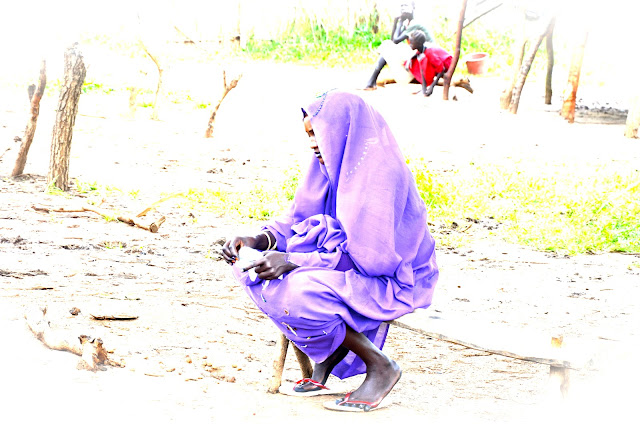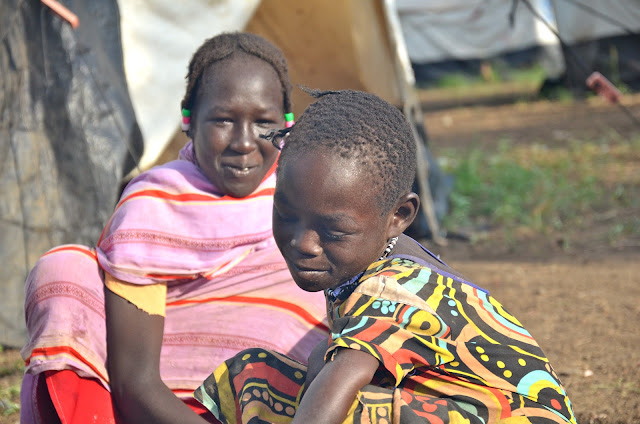All names have been changed and photos blurred to protect the identities of the concerned people.
Muna cut a forlorn figure at the roadside, her two year old son straddling her hip.
She was deeply troubled. She had elected to move to another refugee camp with the man she loved and her two young children. Her father, a community leader, had forbidden her to take her four year old daughter with her.
But, it was the desperate gestures of another woman that caught my attention at the UNHCR transit centre that morning.
The convoy taking refugees to their new homes in Gendrassa camp had stalled. The vehicles were lined up on the road with the ambulance carrying elderly persons in the lead. Passengers were all seated in the UNHCR bus, mostly women and children. Able-bodied men generally ride on the back of trucks with the family belongings. Others walk the 70km distance herding cows and goats, and arrive in Gendrassa many days later.
I noticed a woman of indeterminate age in the middle of the road behind the bus. There was a young man with her and one of my UNHCR colleagues. The woman seemed to be pleading with the young man. At the same time, my colleague was appealing to her to get on the bus, giving reassurances that her son would be safe with UNHCR. The woman did not seem to be convinced.
Later I learned that she was a widow. She had several young children on the bus. The young man, whom I shall call Yusuf, was her eldest son.
By then I had been in the refugee camps long enough to recognize the importance of families maintaining togetherness as a coping mechanism. Later I deduced that Yusuf's mother had legitimate concerns about her son's security, and desperately wanted him to get onto that bus.
Yusuf, on the other hand, chose to remain in Jamam with Muna, the young woman who had chosen to be his bride against her father's wishes. By daring to live with Yusuf she had incurred the old man's wrath. The father had forbidden Muna from taking her four year old daughter with her.
Eventually Yusuf's mother allowed herself to be convinced. She boarded the bus albeit reluctantly, and the convoy left for Gendrassa. I approached the couple to hear their story.
Muna told me the people from her village walked for five days before reaching Elfoj at the border. They fled because of war. She and her husband Muktar carried their two children on their backs; the boy was then a little over one year old and the girl was just over three.
Muna said they all lived in Elfoj for about a month. During that time, Muktar divorced her, invoking ṭalāq in accordance with tradition. According to Muna, Muktar told her father he wanted nothing more to do with her (Muna) or their two children.
In due course, the community was transported by UNHCR and NGOs from Elfoj to Jamam, where Muna lived with her father and the rest of the family.
Sudanese refugees in Upper Nile live in clusters that are named after their village of origin, in a sense maintaining the social fabric that would have been ripped by the trauma of forced displacement. This being said, the choice of where to live is voluntary; no individual is forced to live with their community.
To me, Muna's defiance symbolized a chip off the old block. She said her father was headstrong, a very proud man. He owned plenty of cattle and was the sheikh (leader) of his community. Audaciously she had chosen to go away, to marry Yusuf against her father's will. Still, she conceded, if he refused to release the child she had not the power to go against that wish. It was evidently more than a battle of wills. The rights of a child, her child, were at stake.
Muna was heavy-hearted. She said her little boy was very attached to Yusuf's mother. He had cried to see his would-be grandma go away that morning. Her uncles had advised that she (Muna) should just go. She was tempted to do so, but something was holding her back--she could not desert her own flesh and blood. Her own mother died when Muna was a young child. "A child's place is with the mother," she said, adding that her daughter was ill with fever and was not eating well. She needed to look after her.
Muna showed me her ration card. Both her children were registered in her name, according to UNHCR regulations. As the principal caregivers, mothers are entrusted with the responsibility for collecting entitlements on behalf of their children. Exceptions are made where the mother is absent or is otherwise unable to care for the child. An example of underlying concerns is that a man might remarry, or divert (eg. sell) food and other forms of invidivual assistance, and thus deprive the child or children.
I probed, trying to make sense of Muna's story. Was she perhaps betrothed to a man of her father's choosing? No, came the reply. Was it a matter of dowry? Negative. In accordance with tradition, Yusuf's family had approached Muna's father to ask for her hand in marriage, offering to pay dowry. Her father had turned them away. Muna's elder brother and her uncles pleaded on her behalf. Her father would not hear of it. Muna could go with her son, he said. His granddaughter would not leave his homestead.
Muna's maternal uncle Karim found us chatting. He said the old man did not want Muna to leave; he was against the marriage. He said Muna's first husband, Muktar, had since remarried and was living in Jamam with his new wife. He (Karim) and others had tried to get Muna's father to change his mind. The old man was intransigent, arguing that if the children's "owner" were ever to come for them he wouldn't know what to say. In their tradition when a couple divorces, the children become the father's property.
Afterwards I had a quick chat with Yusuf. He confirmed my suspicion that his mother had been afraid he might come into harm's way in Jamam. He did not understand what Muna's father had against him. He had humiliated Yusuf's people. When they had approached him to ask for Muna's hand in marriage, he turned them away. Yusuf said he would live with Muna as man and wife, and would look after her children. Yusuf did not think the old man would agree to release Muna's daughter.
I bade the couple goodbye, puzzling over the conundrum that was revealed to me through a chance encounter by the roadside. Muna's determination to put right the unjustness of her father's decision was remarkable. She could have boarded that bus with her son and Yusuf's family, and gone off to start a new life. She didn't. I thought to myself, Muna's father might disagree with her choices, but did he have the right to prevent her from being with her young daughter. Did the child have rights? Did the mother have rights?
As we drove back to the UNHCR office, I contemplated the motives of the father I had not met. I saw in his intransigence a risk that he might blind himself to the gathering clouds of change. The unceremonious uprooting of his community and the forced displacement that had brought them to South Sudan were omens. The change would take place imperceptibly with one precedent - and then another - provoking sporadic shocks...
My imaginings evoked the experiences of Obi Okonkwo, protagonist in Nigerian author Chinua Achebe's Things Fall Apart.
Muna cut a forlorn figure at the roadside, her two year old son straddling her hip.
She was deeply troubled. She had elected to move to another refugee camp with the man she loved and her two young children. Her father, a community leader, had forbidden her to take her four year old daughter with her.
But, it was the desperate gestures of another woman that caught my attention at the UNHCR transit centre that morning.
I noticed a woman of indeterminate age in the middle of the road behind the bus. There was a young man with her and one of my UNHCR colleagues. The woman seemed to be pleading with the young man. At the same time, my colleague was appealing to her to get on the bus, giving reassurances that her son would be safe with UNHCR. The woman did not seem to be convinced.
By then I had been in the refugee camps long enough to recognize the importance of families maintaining togetherness as a coping mechanism. Later I deduced that Yusuf's mother had legitimate concerns about her son's security, and desperately wanted him to get onto that bus.
Yusuf, on the other hand, chose to remain in Jamam with Muna, the young woman who had chosen to be his bride against her father's wishes. By daring to live with Yusuf she had incurred the old man's wrath. The father had forbidden Muna from taking her four year old daughter with her.
Eventually Yusuf's mother allowed herself to be convinced. She boarded the bus albeit reluctantly, and the convoy left for Gendrassa. I approached the couple to hear their story.
Muna told me the people from her village walked for five days before reaching Elfoj at the border. They fled because of war. She and her husband Muktar carried their two children on their backs; the boy was then a little over one year old and the girl was just over three.
In due course, the community was transported by UNHCR and NGOs from Elfoj to Jamam, where Muna lived with her father and the rest of the family.
To me, Muna's defiance symbolized a chip off the old block. She said her father was headstrong, a very proud man. He owned plenty of cattle and was the sheikh (leader) of his community. Audaciously she had chosen to go away, to marry Yusuf against her father's will. Still, she conceded, if he refused to release the child she had not the power to go against that wish. It was evidently more than a battle of wills. The rights of a child, her child, were at stake.
Muna's maternal uncle Karim found us chatting. He said the old man did not want Muna to leave; he was against the marriage. He said Muna's first husband, Muktar, had since remarried and was living in Jamam with his new wife. He (Karim) and others had tried to get Muna's father to change his mind. The old man was intransigent, arguing that if the children's "owner" were ever to come for them he wouldn't know what to say. In their tradition when a couple divorces, the children become the father's property.
- He viewed his daughter's actions as an affront... a shock for sure.
- Would he then not perceive the enforcement of child rights as encroaching on inviolable customary laws... shock.
- Management of activities in refugee camps would be transferred to elected committees; progressively youth, women, older persons and persons with disabilities would have a voice in decision-making, perhaps emasculating his iron grip ... shock, shock, shock.
My imaginings evoked the experiences of Obi Okonkwo, protagonist in Nigerian author Chinua Achebe's Things Fall Apart.
Even now, as I speculate about an individual whose side of the story I did not hear, I wonder how Muna's father could possibly to justify his actions.
As for Muna's story, it is for me a reminder of the distance women the world over still have to go to have their rights and choices respected.

























































































